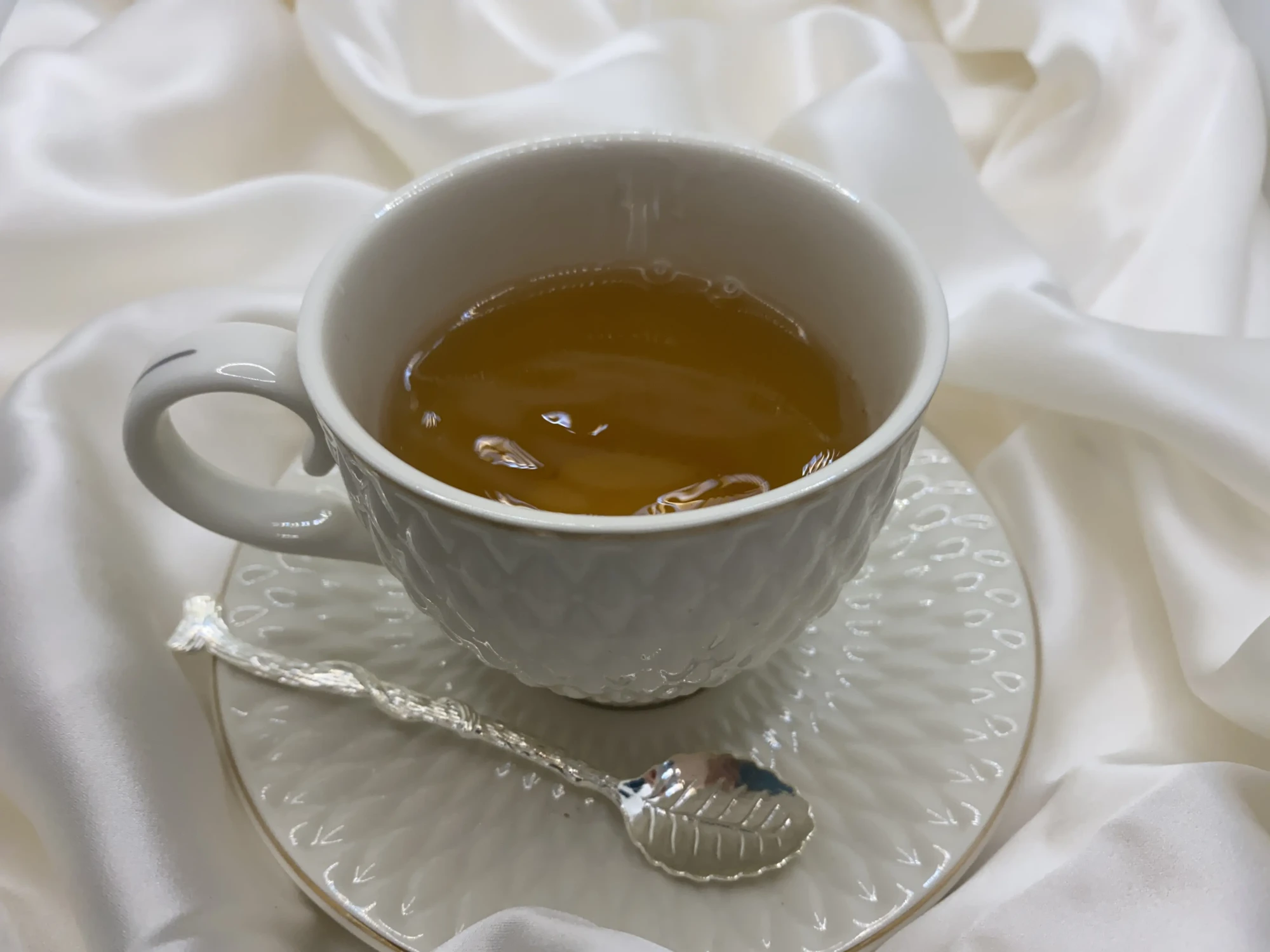
You know that feeling when autumn hits and your body starts sending mixed signals? One day you’re dealing with seasonal sniffles, the next you can’t sleep because your mind won’t stop racing about winter prep. I’ve been there, clutching my third cup of regular tea wondering why I still feel off-balance. Turns out, switching to specific herbal teas based on what your body actually needs can make a real difference. Here’s what I discovered after testing twelve different varieties.
Key Takeaways
- Chamomile tea promotes better sleep quality and reduces anxiety through apigenin, an antioxidant that targets brain receptors naturally.
- Ginger tea fights inflammation, settles digestion, and helps regulate blood sugar when consuming rich autumn and holiday foods.
- Peppermint tea opens airways with menthol, providing natural allergy relief while boosting mental focus during busy seasonal periods.
- Echinacea and rooibos teas strengthen immune systems with antioxidants, reducing cold duration and supporting wellness during seasonal transitions.
- Hibiscus tea lowers blood pressure naturally while nettle tea reduces histamine production, providing heart health and allergy relief benefits.
Chamomile Tea for Relaxation and Better Sleep
As autumn’s crisp air settles in and your stress levels seem to climb higher than your heating bill, chamomile tea becomes your cozy evening companion. This gentle powerhouse contains apigenin, an antioxidant that targets specific brain receptors to promote sleepiness and crush anxiety. You’ll discover that studies prove chamomile improves both sleep quality and duration, making it your secret weapon against insomnia’s nightly battles.
Research published in the Journal of Clinical Psychopharmacology shows it reduces generalized anxiety symptoms, giving you real control over those racing thoughts. Since it’s caffeine-free with anti-inflammatory properties, you’re getting muscle tension relief alongside mental calm. That soothing flavor transforms chilly evenings into peaceful retreats, empowering your autumn wellness routine. Unlike caffeinated beverages that can stay in your system for up to 6 hours and block sleep-promoting chemicals, chamomile tea serves as the perfect herbal alternative for your evening routine.
Ginger Tea for Digestive Health and Inflammation Relief
When your stomach starts rumbling louder than autumn thunder and those rich holiday treats are already calling your name, ginger tea swoops in like a digestive superhero with a serious anti-inflammatory cape. You’ll find gingerol, the powerhouse compound in ginger, literally fights inflammation while settling your stomach’s rebellion.
Unlike black tea that might add caffeine chaos, this autumn tea works as your digestive ally, helping regulate blood sugar when you’ve overdone the pumpkin everything. I’ve watched ginger tea rescue my gut after Thanksgiving dinner disasters more times than I’ll admit.
Among herbal teas, it’s your warming weapon against seasonal discomfort, supporting weight management while you navigate fall’s food temptations with newfound digestive confidence. For a more substantial approach to managing your autumn wellness goals, consider pairing your ginger tea routine with meal prep ideas that focus on protein-rich options like overnight oats with berries or Greek yogurt parfaits.
Peppermint Tea for Respiratory Support and Clarity
While your lungs feel like they’re staging their own autumn rebellion against pollen, dust, and whatever else is floating around, peppermint tea arrives with menthol-powered relief that’ll make you wonder why you suffered through another stuffy season.
When your respiratory system declares war on seasonal allergens, peppermint tea swoops in like a menthol-powered superhero to save the day.
This revitalizing powerhouse doesn’t just clear your airways – it sharpens your mental game too. When I switched to peppermint tea during my afternoon slump, I noticed clearer thinking within days.
- Menthol opens airways naturally, giving you breathing room
- Cognitive boost keeps your mind sharp during busy seasons
- Anti-inflammatory properties tackle those annoying allergy symptoms
- Digestive support calms your stomach after heavy meals
The invigorating flavor alone makes you feel like you’re conquering the season instead of surviving it. As an added bonus, peppermint oil can soothe the scalp while you sip your way to respiratory wellness.
Rooibos Tea for Antioxidant Protection
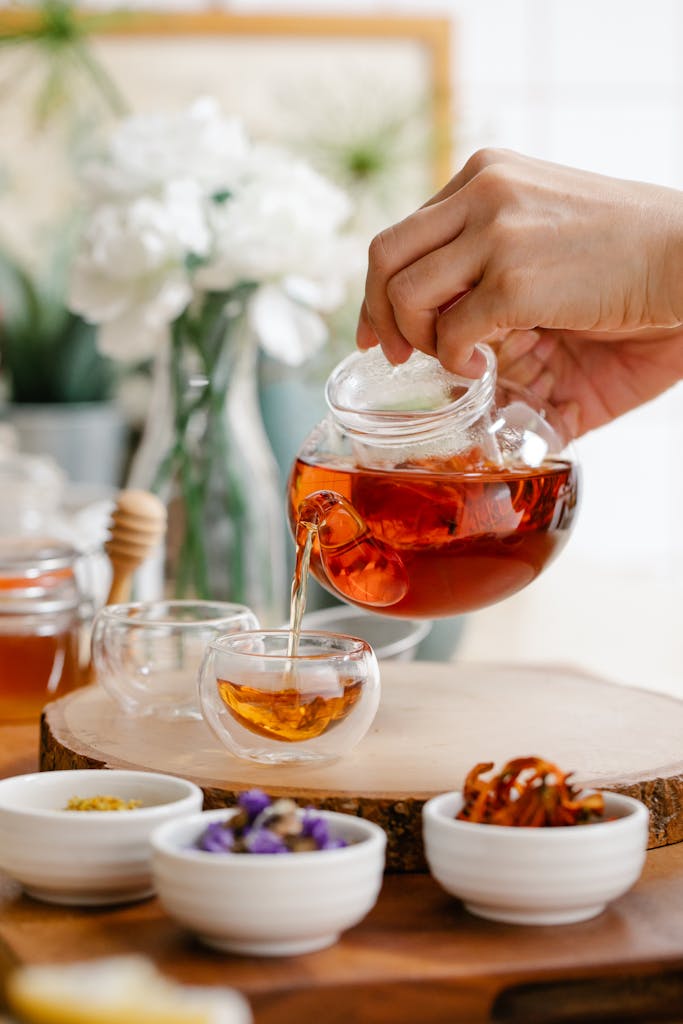
When autumn’s crisp air arrives and you’re craving something warm but don’t want the caffeine jitters, rooibos tea becomes your perfect companion with its naturally caffeine-free comfort. This South African gem packs a serious antioxidant punch with compounds like aspalathin and quercetin, giving your cells the protection they need as you move into the busier fall season.
You’ll love how this sweet, nutty tea delivers all the cozy vibes without keeping you up at night, while its rich antioxidant content works behind the scenes to support everything from heart health to healthy aging. Pair your afternoon rooibos with a protein smoothie featuring banana and spinach for a balanced wellness routine that nourishes your body from the inside out.
Rich Antioxidant Content
As autumn arrives with its crisp air and shorter days, your body’s facing a seasonal shift that puts extra stress on your immune system. That’s where rooibos tea steps in like your personal antioxidant bodyguard. This South African red bush tea doesn’t mess around when it comes to protective compounds.
You’re getting a powerhouse blend of antioxidants that’ll fortify your defenses:
- Flavonoids – Your cellular repair crew working overtime
- Polyphenols – The inflammation fighters you didn’t know you needed
- Aspalathin – The blood sugar regulator that’s basically rooibos tea’s secret weapon
- Quercetin – Your skin’s environmental stress shield
These compounds work together, creating an antioxidant army that’s ready to tackle whatever autumn throws at you. Plus, you’re sipping zero caffeine while building your body’s natural resistance.
Natural Caffeine-Free Benefits
The best part about rooibos tea’s antioxidant arsenal? You’re getting all that protective power without a single jolt of caffeine keeping you wired past midnight. I learned this the hard way after switching from my usual evening green tea ritual, which had me staring at the ceiling until 2 AM like some kind of insomniac owl.
Rooibos tea delivers flavonoids like aspalathin and nothofagin that fight inflammation and may even help prevent cancer, all while letting you actually sleep afterward. Studies show it can lower blood pressure and support heart health too. Plus, those unique polyphenols might protect your brain and boost cognitive function. It’s like having your wellness cake and eating it too, minus the sugar crash.
Echinacea Tea for Immune System Strengthening
As autumn rolls around and everyone starts sniffling around you, echinacea tea becomes your best friend for keeping those pesky colds at bay. This purple flower packs a serious punch when it comes to boosting your immune system, and honestly, it’s way cheaper than loading up on expensive vitamin supplements at the pharmacy.
You’ll want to know exactly how to brew it right and when to start drinking it, because timing really matters if you want to stay healthy through flu season. For an extra wellness boost during your evening routine, consider adding some eucalyptus essential oil to your bath salts to support respiratory health while you sip your echinacea tea.
Echinacea’s Immune-Boosting Properties
When cold season starts creeping up on us like that unwelcome relative at Thanksgiving, I always reach for my trusty echinacea tea stash. This powerhouse herb doesn’t mess around when it comes to immune-boosting support, and you’ll want to harness every bit of its strength.
Echinacea’s compounds work like tiny warriors in your system, stimulating your immune response when you need it most. Here’s what makes this herb your secret weapon:
- Reduces cold duration – Studies show it shortens those miserable sick days
- Lessens symptom severity – You’ll bounce back faster and stronger
- Provides antioxidant protection – Fights inflammation throughout your body
- Supports seasonal wellness – Perfect for fall and winter immune maintenance
Take control of your health this season.
Autumn Cold Prevention
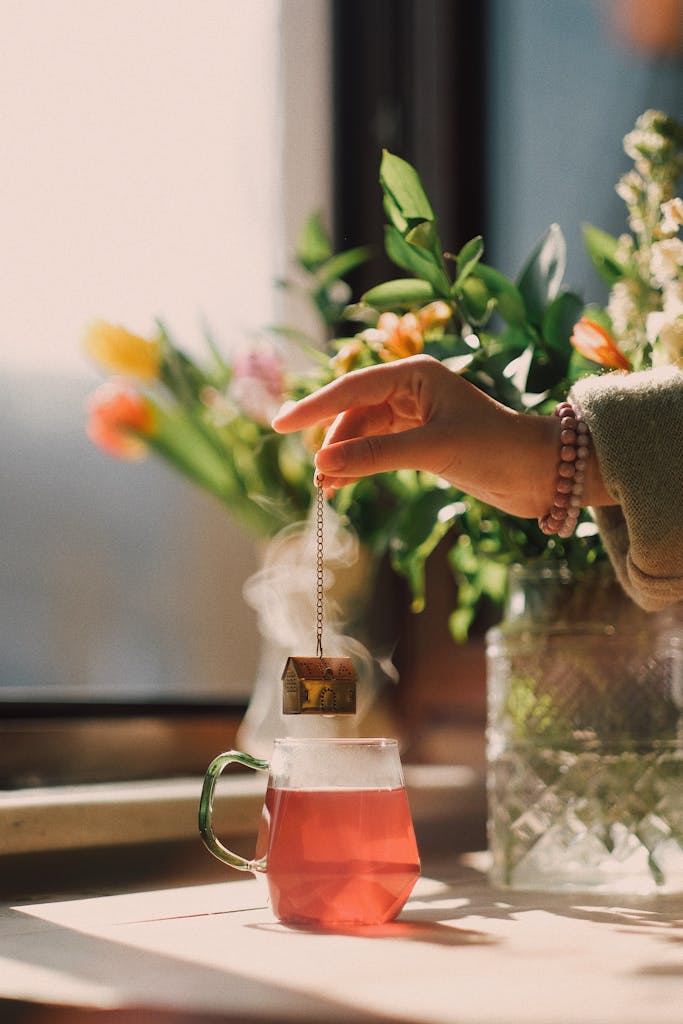
Beyond just treating symptoms after they hit, echinacea tea becomes your daily insurance policy against autumn’s parade of sniffles and sneezes. You’re not just sipping tea—you’re building an army of white blood cells that’ll tackle germs before they set up camp in your system.
You’ve watched countless friends skip their echinacea routine, then spend $30 on tissues and three days complaining about congestion. Meanwhile, those who commit to drinking it consistently throughout fall report shorter, milder cold symptoms when illness does strike.
The secret lies in echinacea’s ability to strengthen your natural defenses before you need them. Think of it as training your immune system for battle rather than scrambling for weapons mid-fight.
Optimal Brewing Methods
Getting the most out of your echinacea tea isn’t rocket science, but I’ve learned that small brewing mistakes can slash its immune-boosting power by half. After countless thoughtfully crafted cups, I’ve discovered that your brewing method determines whether you’re drinking liquid gold or expensive hot water.
Steep for 5-7 minutes – Any longer destroys delicate compounds
Use filtered water – Tap water’s chemicals mess with natural flavors
Choose loose leaf over bags – Infusers liberate maximum potency
Let it cool slightly – Your body absorbs compounds better at moderate temperatures
The difference is night and day. When I rushed my first attempts, I basically threw money down the drain. Now I treat each cup like the immune system investment it is.
Turmeric Tea for Anti-Inflammatory Benefits
As autumn settles in and my joints start creaking like an old wooden door, I’ve discovered that turmeric tea has become my golden ticket to feeling more comfortable throughout the day.
This caffeine-free powerhouse delivers curcumin, which tackles inflammation like a boss. You’ll notice reduced joint stiffness within two weeks of daily consumption. The warm spices create a comforting ritual that fits perfectly into autumn evenings.
| Benefit | Timeline | Power Level |
|---|---|---|
| Joint Relief | 1-2 weeks | High |
| Immune Boost | 3-5 days | Medium |
| Heart Health | 2-4 weeks | High |
| Sleep Quality | Same day | Low |
| Antioxidant Protection | Immediate | High |
I brew mine with a teaspoon of ground turmeric, adding black pepper to enhance absorption by 2000%. The earthy flavor grows on you, and your body will thank you for this golden investment. Remember that consistency over intensity is key – even 5 minutes of intentional self-care can be more beneficial than an hour of forced relaxation, so making this simple tea ritual part of your daily routine will yield better results than sporadic elaborate wellness sessions.
Lemon Balm Tea for Stress Reduction
While turmeric handles my physical aches, my mind needed its own rescue plan when autumn stress started hitting harder than a surprise surprise work deadline.
That’s when I discovered lemon balm tea, and honestly, it’s like having a therapist in a teacup. This mint family member doesn’t just taste like citrusy comfort—it actually lowers your cortisol levels, which is science-speak for “chill out, you’re gonna be fine.”
Here’s what lemon balm tea brings to your stress-fighting arsenal:
- Reduces cortisol levels naturally without prescription drama
- Improves focus when your brain feels like scattered leaves
- Enhances mood during those gloomy autumn days
- Promotes calmness without making you feel drowsy
I’ve been drinking it daily for three weeks, and my stress levels have noticeably decreased. The ritual of preparing this soothing tea works just like a warm bubble bath for melting away the day’s tension and creating a moment of pure relaxation.
Elderberry Tea for Cold and Flu Prevention
Just when I thought I’d my autumn wellness routine sorted, cold season decided to crash the party like an uninvited guest who won’t leave. That’s when I discovered elderberry tea’s secret weapon status against seasonal nastiness.
Unlike black teas that just wake you up, this purple powerhouse actually fights back with anthocyanins—fancy compounds that kick viruses to the curb. Studies show elderberry extract cuts cold duration and severity when you catch symptoms early.
I started brewing elderberry among my autumn teas rotation every morning in October, and honestly, it’s like having a bodyguard in your mug. The antioxidants strengthen your immune system while you’re sipping, making it one of the smartest preventative moves you’ll make this season.
Making elderberry tea part of your daily routine becomes easier when you focus on identity-based habits—seeing yourself as someone who prioritizes immune health rather than just trying to avoid getting sick.
Fennel Tea for Digestive Comfort
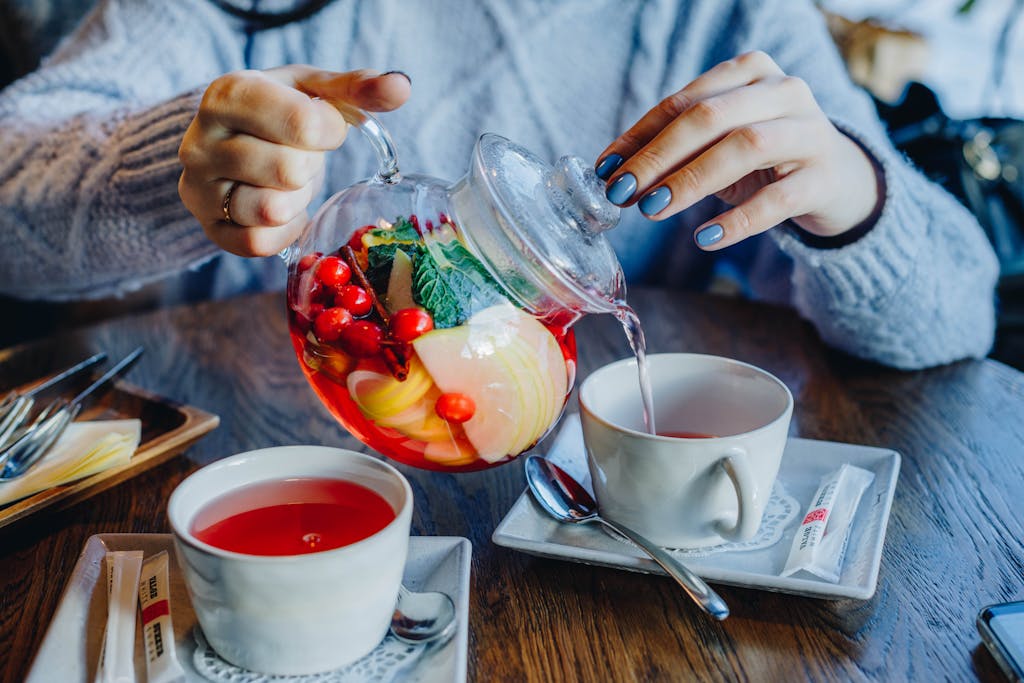
Between Halloween candy binges and Thanksgiving prep mode, my stomach starts staging protests louder than a toddler at bedtime. That’s when I reach for fennel tea, my secret weapon against digestive rebellion.
This centuries-old remedy contains anethole, which works like a gentle muscle relaxer for your gut. It’s basically nature’s antispasmodic, calming those angry digestive muscles without harsh medications.
Here’s what fennel tea tackles for you:
- Bloating – reduces that uncomfortable puffed-up feeling
- Gas – minimizes embarrassing digestive sounds
- Indigestion – soothes stomach upset after heavy meals
- Inflammation – calms irritated digestive tract tissues
I drink one cup after dinner, especially during holiday season. The licorice-like flavor grows on you, and within thirty minutes, your stomach stops its dramatic performance.
Supporting your digestive system with fennel tea may also benefit your gut microbiome, which directly influences mood and cognitive function through the gut-brain connection.
Nettle Tea for Seasonal Allergy Relief
As autumn arrives with its beautiful foliage, you’re probably also dealing with those annoying seasonal allergies that make you sound like a congested mess. Nettle tea might be your new best friend during this time, since it’s packed with natural antihistamines that can tackle your sneezing, itching, and stuffy nose without the drowsiness of regular allergy meds.
The best part is that brewing this earthy-tasting tea is simple, and you can drink it regularly throughout fall to keep those pesky symptoms at bay. For those with ADHD who may be more sensitive to picking up on environmental stimuli like allergens, nettle tea offers a gentle way to support your body’s natural defenses while maintaining enhanced creativity and focus during the season.
Natural Antihistamine Properties
Nothing quite ruins a beautiful autumn morning like waking up with a stuffy nose and itchy eyes, especially when you’re trying to enjoy those gorgeous fall colors. That’s where nettle tea’s natural antihistamine properties become your secret weapon against seasonal allergies.
Unlike synthetic medications that often leave you drowsy, nettle tea works by naturally blocking histamine release in your body. Here’s what makes it so effective:
- Reduces histamine production at the source
- Blocks inflammatory responses that cause congestion
- Provides vitamin C to boost immune function
- Contains natural compounds that calm allergic reactions
You’ll want to drink 2-3 cups daily during peak allergy season for maximum relief. The best part? You’re taking control naturally, without relying on pharmacy shelves.
Autumn Allergy Symptoms
Fall allergies have this sneaky way of showing up right when you’re trying to enjoy cozy sweater weather and pumpkin everything. Your nose starts running like a leaky faucet, your eyes water more than watching old movies, and you’re sneezing every five minutes. It’s like your body decided autumn’s beauty isn’t worth appreciating without a tissue box permanently attached to your hand.
Nettle tea becomes your secret weapon against these annoying symptoms. This natural antihistamine powerhouse tackles nasal congestion, reduces that constant sneezing, and calms those itchy, watery eyes that make you look perpetually emotional. Unlike over-the-counter medications that leave you drowsy or jittery, nettle tea strengthens your immune system naturally. Drink it regularly throughout fall, and you’ll actually get to enjoy the season instead of suffering through it.
Brewing and Dosage
Getting the brewing process right makes all the difference between drinking liquid hay and actually enjoying your allergy-fighting cup of nettle tea. Unlike brewing green tea where timing’s essential, nettle’s more forgiving and won’t turn bitter on you.
- Use 1-2 teaspoons of dried nettle leaves per 8 oz of hot water
- Steep for 5-7 minutes to extract maximum allergy-fighting compounds
- Drink 1-3 cups daily for ideal relief from congestion and sneezing
- Start your routine 2-3 weeks before allergy season hits
You’ll want to begin this regimen before your nose starts its autumn rebellion. Most adults can handle nettle tea without issues, but if you’ve got medical conditions, check with your healthcare provider first.
Hibiscus Tea for Heart Health Support
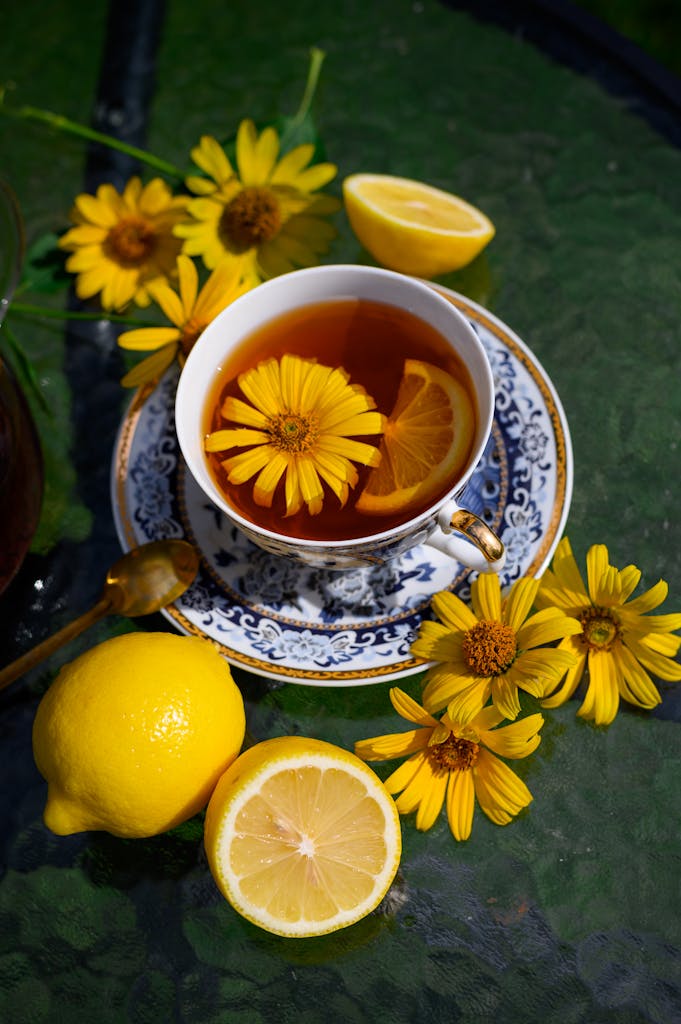
While most of us are reaching for pumpkin spice everything this season, there’s another autumn drink that deserves a spot in your mug – hibiscus tea. This ruby-red powerhouse packs serious cardiovascular benefits that’ll make your heart thank you.
The antioxidants in hibiscus tea actively lower blood pressure and reduce your risk of heart disease and stroke. I’ve watched friends swap their afternoon coffee for hibiscus tea and see their blood pressure readings improve within weeks. The natural diuretic properties help manage hypertension, while anti-inflammatory compounds fight oxidative stress that damages your cardiovascular system. You’re fundamentally giving your heart a daily shield against disease.
Skip the pumpkin spice latte guilt and grab hibiscus tea instead – your heart will appreciate the upgrade.
Dandelion Root Tea for Liver Detoxification
Your liver works harder than a retail employee during Black Friday, filtering toxins and processing everything you’ve thrown at it this year. Dandelion root tea becomes your liver’s best friend, offering powerful detoxification support when you need it most.
This bitter brew packs serious cleansing power through its natural diuretic properties. You’ll tap into these liver-boosting benefits:
- Stimulates bile production – breaks down toxins more efficiently
- Provides antioxidant protection – shields your liver from damage
- Reduces inflammation – supports overall liver health
- Improves digestion – enhances your body’s natural detox processes
I’ve made dandelion root tea part of my autumn routine, and honestly, it tastes like earthy determination in a cup. Sure, it’s bitter, but your liver deserves this gentle yet effective support after months of weekend indulgences.
Conclusion
You’ve got nine incredible herbal teas to help you tackle autumn’s challenges head-on. Whether you’re dealing with restless nights, digestive drama, or seasonal sniffles, there’s a cup waiting for you. Start with just one or two teas that address your biggest concerns, then gradually add others to your routine. Your body will thank you as you navigate the season feeling stronger, more relaxed, and ready for whatever autumn throws your way.




Pingback: 11 Evening Japanese Habits for Better Sleep and Relaxation